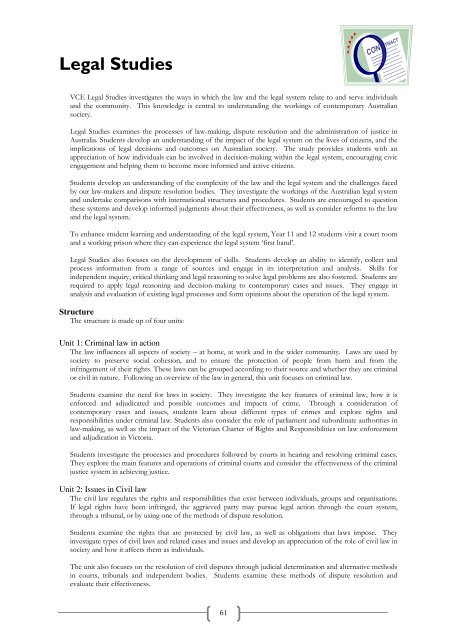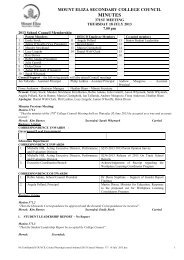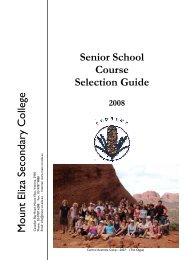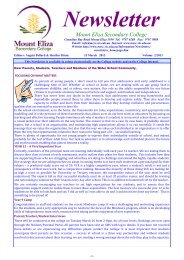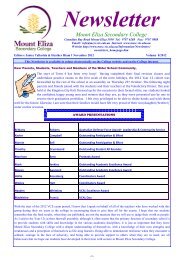9-12 Course Selection Guide - Mount Eliza Secondary College
9-12 Course Selection Guide - Mount Eliza Secondary College
9-12 Course Selection Guide - Mount Eliza Secondary College
Create successful ePaper yourself
Turn your PDF publications into a flip-book with our unique Google optimized e-Paper software.
Legal StudiesVCE Legal Studies investigates the ways in which the law and the legal system relate to and serve individualsand the community. This knowledge is central to understanding the workings of contemporary Australiansociety.Legal Studies examines the processes of law-making, dispute resolution and the administration of justice inAustralia. Students develop an understanding of the impact of the legal system on the lives of citizens, and theimplications of legal decisions and outcomes on Australian society. The study provides students with anappreciation of how individuals can be involved in decision-making within the legal system, encouraging civicengagement and helping them to become more informed and active citizens.Students develop an understanding of the complexity of the law and the legal system and the challenges facedby our law-makers and dispute resolution bodies. They investigate the workings of the Australian legal systemand undertake comparisons with international structures and procedures. Students are encouraged to questionthese systems and develop informed judgments about their effectiveness, as well as consider reforms to the lawand the legal system.To enhance student learning and understanding of the legal system, Year 11 and <strong>12</strong> students visit a court roomand a working prison where they can experience the legal system ‘first hand’.Legal Studies also focuses on the development of skills. Students develop an ability to identify, collect andprocess information from a range of sources and engage in its interpretation and analysis. Skills forindependent inquiry, critical thinking and legal reasoning to solve legal problems are also fostered. Students arerequired to apply legal reasoning and decision-making to contemporary cases and issues. They engage inanalysis and evaluation of existing legal processes and form opinions about the operation of the legal system.StructureThe structure is made up of four units:Unit 1: Criminal law in actionThe law influences all aspects of society – at home, at work and in the wider community. Laws are used bysociety to preserve social cohesion, and to ensure the protection of people from harm and from theinfringement of their rights. These laws can be grouped according to their source and whether they are criminalor civil in nature. Following an overview of the law in general, this unit focuses on criminal law.Students examine the need for laws in society. They investigate the key features of criminal law, how it isenforced and adjudicated and possible outcomes and impacts of crime. Through a consideration ofcontemporary cases and issues, students learn about different types of crimes and explore rights andresponsibilities under criminal law. Students also consider the role of parliament and subordinate authorities inlaw-making, as well as the impact of the Victorian Charter of Rights and Responsibilities on law enforcementand adjudication in Victoria.Students investigate the processes and procedures followed by courts in hearing and resolving criminal cases.They explore the main features and operations of criminal courts and consider the effectiveness of the criminaljustice system in achieving justice.Unit 2: Issues in Civil lawThe civil law regulates the rights and responsibilities that exist between individuals, groups and organisations.If legal rights have been infringed, the aggrieved party may pursue legal action through the court system,through a tribunal, or by using one of the methods of dispute resolution.Students examine the rights that are protected by civil law, as well as obligations that laws impose. Theyinvestigate types of civil laws and related cases and issues and develop an appreciation of the role of civil law insociety and how it affects them as individuals.The unit also focuses on the resolution of civil disputes through judicial determination and alternative methodsin courts, tribunals and independent bodies. Students examine these methods of dispute resolution andevaluate their effectiveness.61


